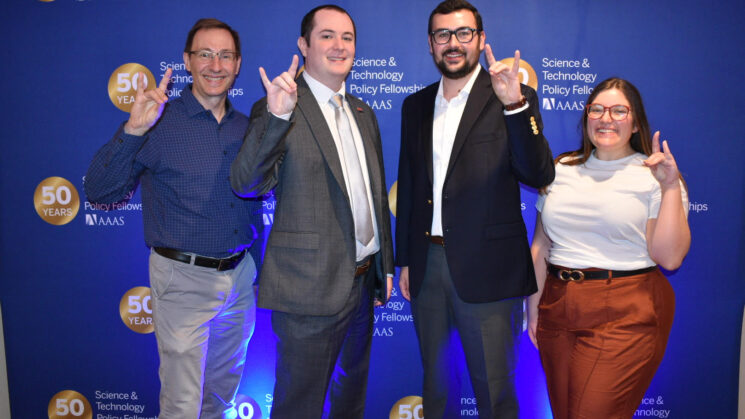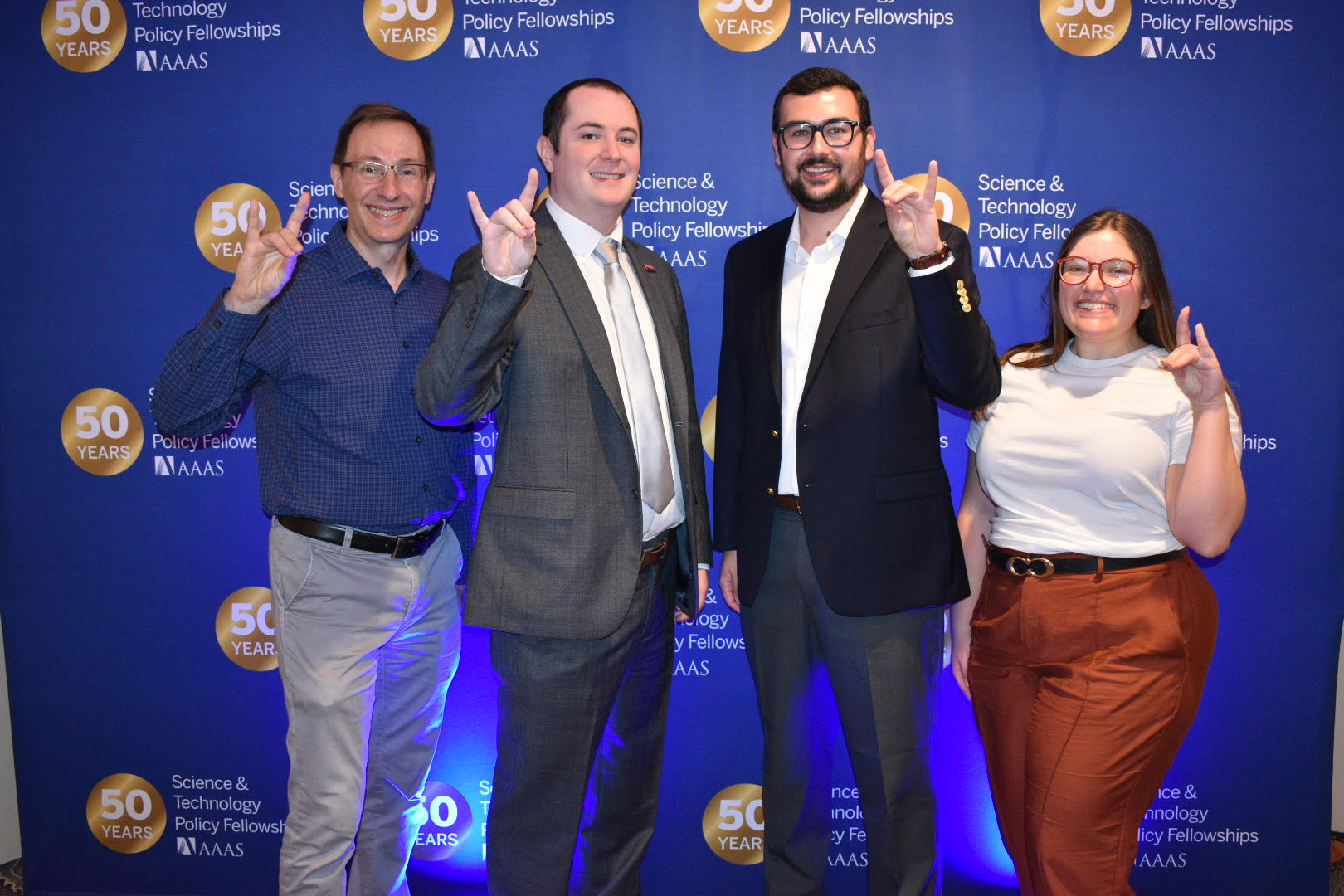

Left to right: Jason Delborne, William Murray, William Casola, and Morgan DiCarlo, at the AAAS Science & Technology Policy Fellowship Orientation in Washington, D.C. in September 2023.
For immediate release
Contact: Patti Mulligan, phmullig@ncsu.edu
AAAS: Kat Song, 202-326-6614, ksong@aaas.org
Washington, D.C., and Raleigh, NC (September 20, 2023) — The American Association for the Advancement of Science (AAAS) is pleased to announce that Dr. Jason Delborne, Professor of Science, Policy, and Society in the Department of Forestry and Environmental Resources and the Genetic Engineering and Society Center, and Dr. Morgan DiCarlo, Dr. William Casola, and Mr. William Murray MNE, North Carolina State University alumni, as members of the 51st class of the Science & Technology Policy Fellowships (STPF) program. STPF fellows are chosen from a select group of scientists to engage in a one-year immersive educational opportunity to gain hands-on experience in the public policy arena while leveraging their expertise to help confront major societal issues in the U.S. government.
Among the 276 highly trained STEM (science, technology, engineering and mathematics) professionals selected, Dr. Delborne will serve as a staff scientist in the National Nanotechnology Coordination Office (NNCO) under the White House Office of Science and Technology Policy. The NNCO strives to convene the nanotechnology community across university, private, and public sectors to share information, engage the public, and promote responsible innovation. This assignment builds on Delborne’s career of research and teaching about the social, environmental, and political dynamics of emerging technologies.
Dr. DiCarlo’s fellowship is with the Environmental Protection Agency where she will serve as Translational Science and Climate Change Research Fellow in the Office of Research and Development. Dr. DiCarlo completed her PhD in Civil Engineering at North Carolina State University, where her research focused on community dynamics during water-related hazards. She is also a licensed Professional Engineer in North Carolina and a TEDx speaker.
Dr. Casola will spend a year serving as an Arctic Science Policy Fellow with the National Science Foundation – Office of Polar Programs. A conservation social scientist by training, Dr. Casola completed his PhD and BS in Fisheries, Wildlife, and Conservation Biology at North Carolina State University. His doctoral research explored how visitors use and value wildlife management areas in North Carolina. Most recently, he completed his postdoctoral training in the School of Forest, Fisheries, and Geomatics Sciences at the University of Florida.
Mr. Murray was selected for the STPF program through the American Nuclear Society’s Glenn T. Seaborg Congressional Science and Engineering Fellowship and will serve as a scientific advisor in U.S. Congress beginning in January 2024. Following his completion of NC State’s Master of Nuclear Engineering in 2019, Mr. Murray joined General Electric and served in a variety of technical roles through their prestigious Edison Engineering Development Program and currently works as an Advanced Reactor Systems Engineer for GE from Pittsburgh, PA. His industry experience brings a unique perspective on how science policy affects technical product design and broader business decisions.
“Having been an STPF fellow myself, the start of each fellowship year brings both fond memories and excitement for the future,” said Rashada Alexander, Ph.D., STPF director and alumna fellow. “The 51st class of STPF fellows are quite the gathering of minds: these are expert-level scientists and engineers who have chosen to devote a year or more to help ensure that the nation’s policies are informed by science.”
Fellows will learn first-hand about federal policymaking and implementation. They will also gain invaluable skills in communication, diplomacy, collaboration and consensus-building.
“I’ve had the privilege of serving on a number of national and international expert panels that contribute to policymaking, but this fellowship offers a different level of engagement,” said Delborne. “I’m thrilled for the challenge of adapting my experience as an academic to the policy environment, and when I return to NC State I hope to increase the policy-relevance of my research program and teaching.”
“I am thrilled to be a member of the 2023-2024 class of Science and Technology Policy Fellows,” Casola said. “I’m excited to build upon the skills and experience I gained at NC State and hope to make a meaningful contribution to Arctic science and policy.”
DiCarlo added: “Being a part of this fellowship gives me the exciting opportunity to continue to develop professionally, while applying my graduate training to launch an impactful career addressing water and climate challenges at the federal level.”
Murray shared why he accepted the fellowship – “Our ability to innovate with new developments in science and engineering is founded on support from federal policy. I am excited to both share my insight from working in industry and to learn more about the policy-making process from legislative experts in the halls of Congress.”
The 2023-24 fellowship class is sponsored by organizations including AAAS, the Moore Foundation and partner societies. Of the 276 fellows chosen, 38 will serve in Congress, one will serve at the Federal Judicial Center, and 237 will serve in the executive branch among 19 federal agencies or departments. New this year, among the 38 fellows in Congress, six are members of AAAS’ special AI Rapid Response Cohort – experts in artificial intelligence and related areas recruited to help confront pressing issues such as privacy, intellectual property rights, employment, and innovation in the field.
The STPF program supports evidence-based policymaking by leveraging the knowledge and analytical mindset of science and engineering experts, and trains leaders for a strong U.S. science and technology enterprise. Fellows represent a vast array of disciplines, backgrounds and career stages. After the fellowship, many remain in the policy arena working at the federal, state, regional or international level, while others pursue careers in academia, industry or the nonprofit sector.
Founded in 1973, the STPF program celebrated its 50th anniversary earlier this year. At the end of their service, these fellows will join a select corps of 4,000+ alumni who are equipped to solve problems with a unique set of science policy skills and acumen.
Also this year, STPF is launching an alumni network to stimulate and support collaboration among them to further the STPF mission of supporting evidence-based decision-making in US public policy.
Visit www.aaas.org/stpf to learn more about the AAAS S&T Policy Fellowships.
# # #
The American Association for the Advancement of Science (AAAS) is the world’s largest general scientific society and publisher of the journal Science, as well as Science Translational Medicine; Science Signaling; a digital, open-access journal, Science Advances; Science Immunology; and Science Robotics. AAAS was founded in 1848 and includes more than 250 affiliated societies and academies of science, serving 10 million individuals. Science has the largest paid circulation of any peer-reviewed general science journal in the world. The nonprofit AAAS is open to all and fulfills its mission to “advance science and serve society” through initiatives in science policy, international programs, science education, public engagement, and more. For additional information about AAAS, please visit www.aaas.org.